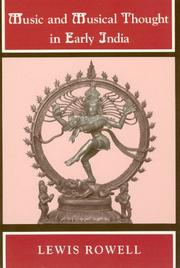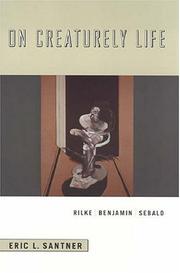| Listing 1 - 10 of 18 | << page >> |
Sort by
|
Book
ISBN: 1614519935 1614518068 9781614518068 9781614517849 1614517843 Year: 2014 Publisher: Berlin Boston
Abstract | Keywords | Export | Availability | Bookmark
 Loading...
Loading...Choose an application
- Reference Manager
- EndNote
- RefWorks (Direct export to RefWorks)
The nine original essays collected in this volume explore the themes of philosophical progress, ultimate explanation, the metaphysics of free will, and the relation of sciences and religion. These essays exemplify Nicholas Rescher''s characteristic mode of combining historical perspectives with analytical elucidation on philosophically contested issues and utilize this methodology to address some of the salient problems of the field.
Philosophy, Modern --- History. --- Philosophy. --- free will. --- philosophical theory.
Periodical

ISSN: 10955054
Abstract | Keywords | Export | Availability | Bookmark
 Loading...
Loading...Choose an application
- Reference Manager
- EndNote
- RefWorks (Direct export to RefWorks)
Includes editorial and copyrighted information, as well as a site search engine. Offers an alphabetical index to the philosophical entries and information on individual philosophers and their beliefs.
Philosophy --- Philosophers --- Philosophie --- Philosophes --- Philosophers. --- Philosophy. --- Mental philosophy --- Humanities --- Scholars --- Arts and Humanities --- philosophical theory
Periodical
ISSN: 01013173 1980539X Year: 1974 Publisher: São Paulo, Universidade Estadual Paulista
Abstract | Keywords | Export | Availability | Bookmark
 Loading...
Loading...Choose an application
- Reference Manager
- EndNote
- RefWorks (Direct export to RefWorks)
"Revista de filosofia."
Philosophy --- Philosophie --- Periodicals. --- Périodiques --- FILOSOFIA --- Filosofie. --- Philosophy. --- PUBLICACIONES PERIODICAS. --- Arts and Humanities --- philosophical theory --- Mental philosophy --- Humanities --- Philosophy - Periodicals.
Book

ISBN: 1772125245 Year: 2021 Publisher: Edmonton, Alberta : University of Alberta Press,
Abstract | Keywords | Export | Availability | Bookmark
 Loading...
Loading...Choose an application
- Reference Manager
- EndNote
- RefWorks (Direct export to RefWorks)
All the Feels / Tous les sens presents research into emotion and cognition in Canadian, Indigenous, and Québécois writings in English or French. Affect is both internal and external, private and public; with its fluid boundaries, it represents a productive dimension for literary analysis. The emerging field of affect studies makes vital claims about ethical impulses, social justice, and critical resistance, and thus much is at stake when we adopt affective reading practices. The contributors ask what we can learn from reading contemporary literatures through this lens. Unique and timely, readable and teachable, this collection is a welcome resource for scholars of literature, feminism, philosophy, and transnational studies as well as anyone who yearns to imagine the world differently. Contributors: Nicole Brossard, Marie Carrière, Matthew Cormier, Kit Dobson, Nicoletta Dolce, Louise Dupré, Margery Fee, Ana María Fraile-Marcos, Smaro Kamboureli, Aaron Kreuter, Daniel Laforest, Carmen Mata Barreiro, Ursula Mathis-Moser, Heather Milne, Eric Schmaltz, Maïté Snauwaert, Jeanette den Toonder
Periodical
ISSN: 11300507 19894651 Year: 1989 Publisher: Murcia : Univ. Murcia, Departamento de Filosofía y Lógica,
Abstract | Keywords | Export | Availability | Bookmark
 Loading...
Loading...Choose an application
- Reference Manager
- EndNote
- RefWorks (Direct export to RefWorks)
Philosophy --- Philosophie --- Periodicals --- Périodiques --- Philosophy. --- Arts and Humanities --- Périodiques --- philosophy --- philosophical theory --- formal philosophy --- history of philosophy --- analytic philosophy --- Mental philosophy --- Humanities --- Philosophy - Periodicals.
Periodical
ISSN: 0100512X Volume: 102 Publisher: Brazil Universidade Federal de Minas Gerais
Abstract | Keywords | Export | Availability | Bookmark
 Loading...
Loading...Choose an application
- Reference Manager
- EndNote
- RefWorks (Direct export to RefWorks)

ISBN: 0226730344 0226730336 9780226730349 0226730328 9780226730325 9780226730332 Year: 1992 Publisher: Chicago
Abstract | Keywords | Export | Availability | Bookmark
 Loading...
Loading...Choose an application
- Reference Manager
- EndNote
- RefWorks (Direct export to RefWorks)
Offering a broad perspective of the philosophy, theory, and aesthetics of early Indian music and musical ideology, this study makes a unique contribution to our knowledge of the ancient foundations of India's musical culture. Lewis Rowell reconstructs the tunings, scales, modes, rhythms, gestures, formal patterns, and genres of Indian music from Vedic times to the thirteenth century, presenting not so much a history as a thematic analysis and interpretation of India's magnificent musical heritage. In Indian culture, music forms an integral part of a broad framework of ideas that includes philosophy, cosmology, religion, literature, and science. Rowell works with the known theoretical treatises and the oral tradition in an effort to place the technical details of musical practice in their full cultural context. Many "ations from the original Sanskrit appear here in English translation for the first time, and the necessary technical information is presented in terms accessible to the nonspecialist. These features, combined with Rowell's glossary of Sanskrit terms and extensive bibliography, make Music and Musical Thought in Early India an excellent introduction for the general reader and an indispensable reference for ethnomusicologists, historical musicologists, music theorists, and Indologists.
Music theory --- Music --- Theory --- music, musical, india, indian, philosophy, philosophical, theory, aesthetics, ideology, culture, cultural studies, tunings, scales, modes, rhythms, gestures, formal patterns, genres, heritage, cosmology, religion, religious, literature, literary, science, oral tradition, sanskrit, ethnomusicology, musicology, sound, tempo, republic, country, national, historical, history, pitch, timing, songs.
Book
ISBN: 022618515X 9780226185156 9780226038056 Year: 2015 Publisher: Chicago
Abstract | Keywords | Export | Availability | Bookmark
 Loading...
Loading...Choose an application
- Reference Manager
- EndNote
- RefWorks (Direct export to RefWorks)
Most scholars link the origin of politics to the formation of human societies, but in this innovative work, Tilo Schabert takes it even further back: to our very births. Drawing on mythical, philosophical, religious, and political thought from around the globe-including America, Europe, the Middle East, and China-The Second Birth proposes a transhistorical and transcultural theory of politics rooted in political cosmology. With impressive erudition, Schabert explores the physical fundamentals of political life, unveiling a profound new insight: our bodies actually teach us politics. Schabert traces different figurations of power inherent to our singular existence, things such as numbers, time, thought, and desire, showing how they render our lives political ones-and, thus, how politics exists in us individually, long before it plays a role in the establishment of societies and institutions. Through these figurations of power, Schabert argues, we learn how to institute our own government within the political forces that already surround us-to create our own world within the one into which we have been born. In a stunning vision of human agency, this book ultimately sketches a political cosmos in which we are all builders, in which we can be at once political and free.
Political science --- Civilization. --- Anthropological aspects. --- Philosophy. --- human, history, historical, academic, scholarly, politics, political, poli sci, philosophy, philosophical, theory, theoretical, society, social studies, birth, mythical, mythology, religious, religion, faith, belief, global, international, america, europe, middle east, eastern, western, china, asia, transcultural, culture, government, power.
Periodical
Abstract | Keywords | Export | Availability | Bookmark
 Loading...
Loading...Choose an application
- Reference Manager
- EndNote
- RefWorks (Direct export to RefWorks)
counterculture --- popular culture --- critical studies --- philosophical theory --- humanities --- literary criticism --- Humanities --- Social sciences --- Humanidades --- ciencias sociales --- Saber y erudición --- Educación humanística --- Medicina y humanidades --- Religión y humanidades --- Behavioral sciences --- Human sciences --- Sciences, Social --- Social science --- Social studies --- Civilization --- Learning and scholarship --- Classical education --- Ciencias humanas --- Arqueología --- Arte --- Filología --- Filosofía --- Historia --- Lingüística --- Religión --- Saber y erudición --- Religión y humanidades

ISBN: 0226735036 0226735028 9786612738494 0226735052 1282738496 9780226735054 9781282738492 6612738499 9780226735023 9780226735030 Year: 2006 Publisher: Chicago University of Chicago Press
Abstract | Keywords | Export | Availability | Bookmark
 Loading...
Loading...Choose an application
- Reference Manager
- EndNote
- RefWorks (Direct export to RefWorks)
In his Duino Elegies, Rainer Maria Rilke suggests that animals enjoy direct access to a realm of being-the open-concealed from humans by the workings of consciousness and self-consciousness. In his own reading of Rilke, Martin Heidegger reclaims the open as the proper domain of human existence but suggests that human life remains haunted by vestiges of an animal-like relation to its surroundings. Walter Benjamin, in turn, was to show that such vestiges-what Eric Santner calls the creaturely-have a biopolitical aspect: they are linked to the processes that inscribe life in the realm of power and authority. Santner traces this theme of creaturely life from its poetic and philosophical beginnings in the first half of the twentieth century to the writings of the enigmatic German novelist W. G. Sebald. Sebald's entire oeuvre, Santner argues, can be seen as an archive of creaturely life. For Sebald, the work on such an archive was inseparable from his understanding of what it means to engage ethically with another person's history and pain, an engagement that transforms us from indifferent individuals into neighbors. An indispensable book for students of Sebald, On Creaturely Life is also a significant contribution to critical theory.
Melancholy in literature. --- Psychoanalysis and literature. --- Benjamin, Walter, --- Rilke, Rainer Maria, --- Sebald, Winfried Georg, --- Influence. --- Criticism and interpretation. --- Melancholy in literature --- Psychoanalysis and literature --- Literature and psychoanalysis --- Psychoanalytic literary criticism --- Literature --- זבאלד, וו. --- Sebald, Max, --- Rilke, René Maria Cäsar, --- Li-erh-kʻo, --- Rielke, Rainer Maria, --- Rilkʻe, Rainŏ Maria, --- Rilḳeh, Rainer Mariyah, --- Rilke, Reiner Marie, --- רילקה, ראינר מריה, --- רילקה, ריינר מריה --- רילקה, ריינר מריה, --- רילקה, רינר מריה --- רילקה, רינר מריה, --- רילקה, רץ מ. --- רילקה, ר.מ --- Benjamin, W. --- Benjamin, Walter --- Sebald, W. G. --- Holz, Detlef, --- Banyaming, --- Benʼyamin, Varutā, --- Peñcamin̲, Vālṭṭar, --- Binyamin, Ṿalṭer, --- בנימין, ולטר --- בנימין, ולטר, --- ולטר, בנימין, --- Penyamin, Palt'ŏ, --- 벤야민 발터, --- リルケ, ライナー マリア --- Rilke, Rainer Maria --- consciousness, self, close reading, analysis, analytical, critical, critique, existence, human, life, relationships, biopolitics, biopolitical, power, authority, poetic, philosophical, theory, theoretical, sebald, rilke, benjamin, literary, literature, philosophy, academic, scholarly, research, ethics, neighbors, communal, community, interpersonal.
| Listing 1 - 10 of 18 | << page >> |
Sort by
|

 Search
Search Feedback
Feedback About UniCat
About UniCat  Help
Help News
News